Science Forum 2013
There is nothing like fish
Wed, 09/25/2013 - 16:05 — Rahel Wyss
If fish would be removed from peoples’ diet in Bangladesh, nothing else could replace that valuable nutrient-rich food. 70% of the Bangladeshi population is eating fish 7 to 14 times within two weeks. Studies prove the positive impact of small fish species on an improved dietary diversity. Moreover, the most important aspect of fish in terms of nutrition is that fish enhances the uptake of micronutrients from food eaten in the same meal. Not to forget, that consumers like the flavour and the added taste of fish to their meal.
Questionable results from breakout session
Wed, 09/25/2013 - 15:49 — Eva Hilt
The problem of how to align agricultural and food policies with nutritional and health targets had been examined from very distinct angles during the first 3 hours Policy and Institutional Approaches in nutrition-sensitive agriculture slot on Monday. It became clear, that the presented approaches themselves so far are not aligned, so that there seems to be huge potential for high quality research which helps to get an idea on how ‘multipolicy’ approaches can make an effective contribution to nutritional improvement.
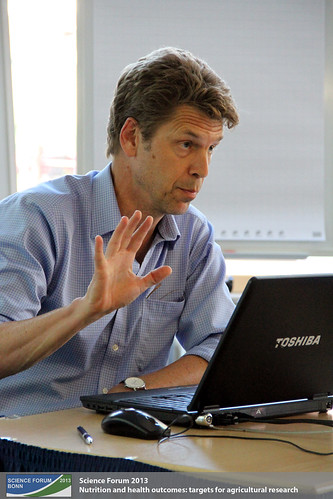 The following article is a collection of questions, as a source of inspiration if you wonder what to do after the conference or in your graduation thesis…
The following article is a collection of questions, as a source of inspiration if you wonder what to do after the conference or in your graduation thesis…
 The following article is a collection of questions, as a source of inspiration if you wonder what to do after the conference or in your graduation thesis…
The following article is a collection of questions, as a source of inspiration if you wonder what to do after the conference or in your graduation thesis…
Trees, diets and urban planners?
Wed, 09/25/2013 - 15:42 — Paulina Campos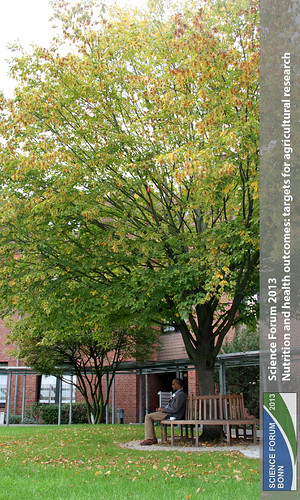 We might often think of trees from an ecological point of view, delivering ecosystem services such as carbon sequestration or preventing soil erosion. But what about their dietary value? How can they contribute to improve food security and nutrition? Do children in areas with more trees have more diverse diets? Amy Ickowitz from the Center for International Forestry Research (CIFR) addressed these questions during her presentation “Role for forests for nutrition” during the session “Diet diversification”.
We might often think of trees from an ecological point of view, delivering ecosystem services such as carbon sequestration or preventing soil erosion. But what about their dietary value? How can they contribute to improve food security and nutrition? Do children in areas with more trees have more diverse diets? Amy Ickowitz from the Center for International Forestry Research (CIFR) addressed these questions during her presentation “Role for forests for nutrition” during the session “Diet diversification”.
How much biodiversity is on your plate?
Wed, 09/25/2013 - 13:23 — Paulina Campos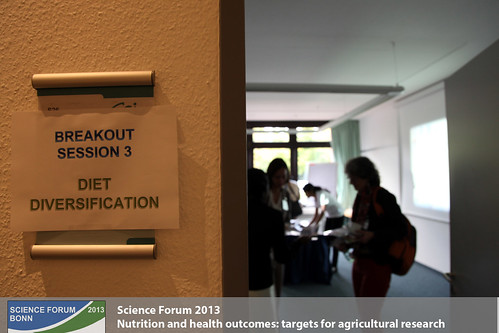 If the french writer and famous foodie Brillat-Savarin (1755-1826) would have been sitting among us at the breakout session about “Role of indigenous (forgotten) foods (plants and animals) in food diversification: what don’t we know?” he would be very dissapointed to see what we human kind has become. “Tell me what you eat and I’ll tell you who you are” wrote once Mr. Savarin. If we consider that from the 7.000 plant species and several thousand animal species used for human nutrition over the past 12.000 years, 98% of our modern diets relies only on 12 plant crops and 14 animal species, what would we answer if he asked us: who are you then now? A result of increasingly simplified diets which is the mirror of increasingly simplified agroecosystems.
If the french writer and famous foodie Brillat-Savarin (1755-1826) would have been sitting among us at the breakout session about “Role of indigenous (forgotten) foods (plants and animals) in food diversification: what don’t we know?” he would be very dissapointed to see what we human kind has become. “Tell me what you eat and I’ll tell you who you are” wrote once Mr. Savarin. If we consider that from the 7.000 plant species and several thousand animal species used for human nutrition over the past 12.000 years, 98% of our modern diets relies only on 12 plant crops and 14 animal species, what would we answer if he asked us: who are you then now? A result of increasingly simplified diets which is the mirror of increasingly simplified agroecosystems.
"The Silver Bullet" for the "The Cinderella Sector"
Wed, 09/25/2013 - 12:54 — Pamella Ogada
Food Safety- Breakout session
“More than one billion of the world population are hungry and more than two billion are sickened each year from the food they ate. Agriculture is exacting a heavy biological cost, but health policy and programs often stop at the clinic door.”
Food safety has for a longtime been ignored in the talks regarding food security, despite food borne diseases being considered the number one killer in the world. This has further been compromised as food security has been stretched based on the high demands. Furthermore, over the years little investments have been directed to this area.
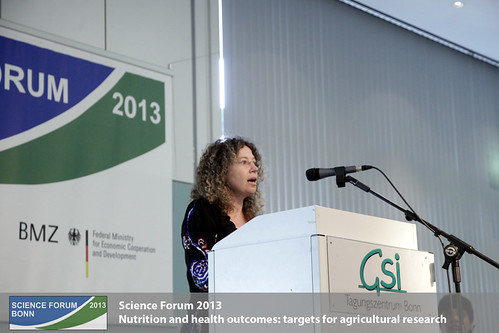 Delia Grace, International Livestock Research Institute (ILRI)
The suggested way to addressing food safety being from farm to folk, which includes the long chain from production to consumption, this includes; from harvesting, to the informal markets, to the storage, as well as areas of waste. Mycotoxins, which are very toxic fungus found in major crops and have been reported to contaminate over 25% of the world produce, are of great interest to researchers.
Delia Grace, International Livestock Research Institute (ILRI)
The suggested way to addressing food safety being from farm to folk, which includes the long chain from production to consumption, this includes; from harvesting, to the informal markets, to the storage, as well as areas of waste. Mycotoxins, which are very toxic fungus found in major crops and have been reported to contaminate over 25% of the world produce, are of great interest to researchers.
 Delia Grace, International Livestock Research Institute (ILRI)
The suggested way to addressing food safety being from farm to folk, which includes the long chain from production to consumption, this includes; from harvesting, to the informal markets, to the storage, as well as areas of waste. Mycotoxins, which are very toxic fungus found in major crops and have been reported to contaminate over 25% of the world produce, are of great interest to researchers.
Delia Grace, International Livestock Research Institute (ILRI)
The suggested way to addressing food safety being from farm to folk, which includes the long chain from production to consumption, this includes; from harvesting, to the informal markets, to the storage, as well as areas of waste. Mycotoxins, which are very toxic fungus found in major crops and have been reported to contaminate over 25% of the world produce, are of great interest to researchers.
Humans, we have a problem
Tue, 09/24/2013 - 23:16 — Eva Hilt
What Germans are supposed to know about the Science Forum: insights from the press conference with Joachim von Braun, head of the Centre for development research and Holger Baum, head of 'MediaCompany'.
AT A GLANCE!! - Science Forum 2013
Tue, 09/24/2013 - 17:50 — Pamella Ogada
"Agricultural research and nutrition go hand in hand with regards to food security." This was the opening remark for the Science Forum 2013. With that, key factors in research regarding major crops like maize and rice, and the requirement of genetic research, need to be put in place. The innovative transfers of research findings is very essential especially to the farm levels; through networking and partnership, exchange is promoted among international agricultural centres, institutes and scientists.
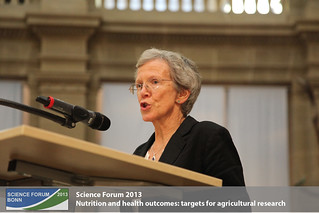 Maggie Gill, ISPC Council Member and Science Forum 2013 Chair
Funding bodies allocate funds for agricultural research institution in partner countries, with the role for its member organizations being to support European agricultural research and development to promote knowledge transfers. This would contribute to success of international agriculture research for development. System level-objectives of these funding bodies include reformation which focuses on reducing rural poverty, improving food security in terms of quantity, quality and affordability, improving nutrition and health, and a sustainable management of environment and natural resources.
Maggie Gill, ISPC Council Member and Science Forum 2013 Chair
Funding bodies allocate funds for agricultural research institution in partner countries, with the role for its member organizations being to support European agricultural research and development to promote knowledge transfers. This would contribute to success of international agriculture research for development. System level-objectives of these funding bodies include reformation which focuses on reducing rural poverty, improving food security in terms of quantity, quality and affordability, improving nutrition and health, and a sustainable management of environment and natural resources.
 Maggie Gill, ISPC Council Member and Science Forum 2013 Chair
Funding bodies allocate funds for agricultural research institution in partner countries, with the role for its member organizations being to support European agricultural research and development to promote knowledge transfers. This would contribute to success of international agriculture research for development. System level-objectives of these funding bodies include reformation which focuses on reducing rural poverty, improving food security in terms of quantity, quality and affordability, improving nutrition and health, and a sustainable management of environment and natural resources.
Maggie Gill, ISPC Council Member and Science Forum 2013 Chair
Funding bodies allocate funds for agricultural research institution in partner countries, with the role for its member organizations being to support European agricultural research and development to promote knowledge transfers. This would contribute to success of international agriculture research for development. System level-objectives of these funding bodies include reformation which focuses on reducing rural poverty, improving food security in terms of quantity, quality and affordability, improving nutrition and health, and a sustainable management of environment and natural resources.
Food for Thought: Do Agricultural Innovations Improve Our Health?
Tue, 09/24/2013 - 17:28 — Vince Canger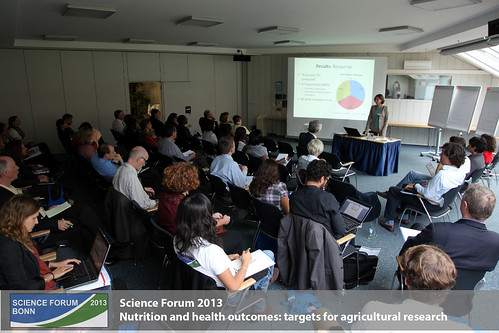 The Science Forum 2013 in Bonn, Germany, Discusses the Links between Agriculture and Health and how they can be Improved
Imagine for a moment that you're a small-scale farmer from a poor region and you grow a number of crops. Some of the crops you sell for cash which you probably use to purchase other foods you don't grow yourself, or to pay for other family expenses. The food you don't sell, you eat. But you later decide to start growing a high-yielding cotton variety with a good market demand. Your new choice in crop brings you greater income which you then use to purchase a wider range of healthier, more nutritious foods that you may not have had access to before. Such a scenario makes sense, unless you consider the contradicting evidence currently coming from research in China. (read more)
The Science Forum 2013 in Bonn, Germany, Discusses the Links between Agriculture and Health and how they can be Improved
Imagine for a moment that you're a small-scale farmer from a poor region and you grow a number of crops. Some of the crops you sell for cash which you probably use to purchase other foods you don't grow yourself, or to pay for other family expenses. The food you don't sell, you eat. But you later decide to start growing a high-yielding cotton variety with a good market demand. Your new choice in crop brings you greater income which you then use to purchase a wider range of healthier, more nutritious foods that you may not have had access to before. Such a scenario makes sense, unless you consider the contradicting evidence currently coming from research in China. (read more)




